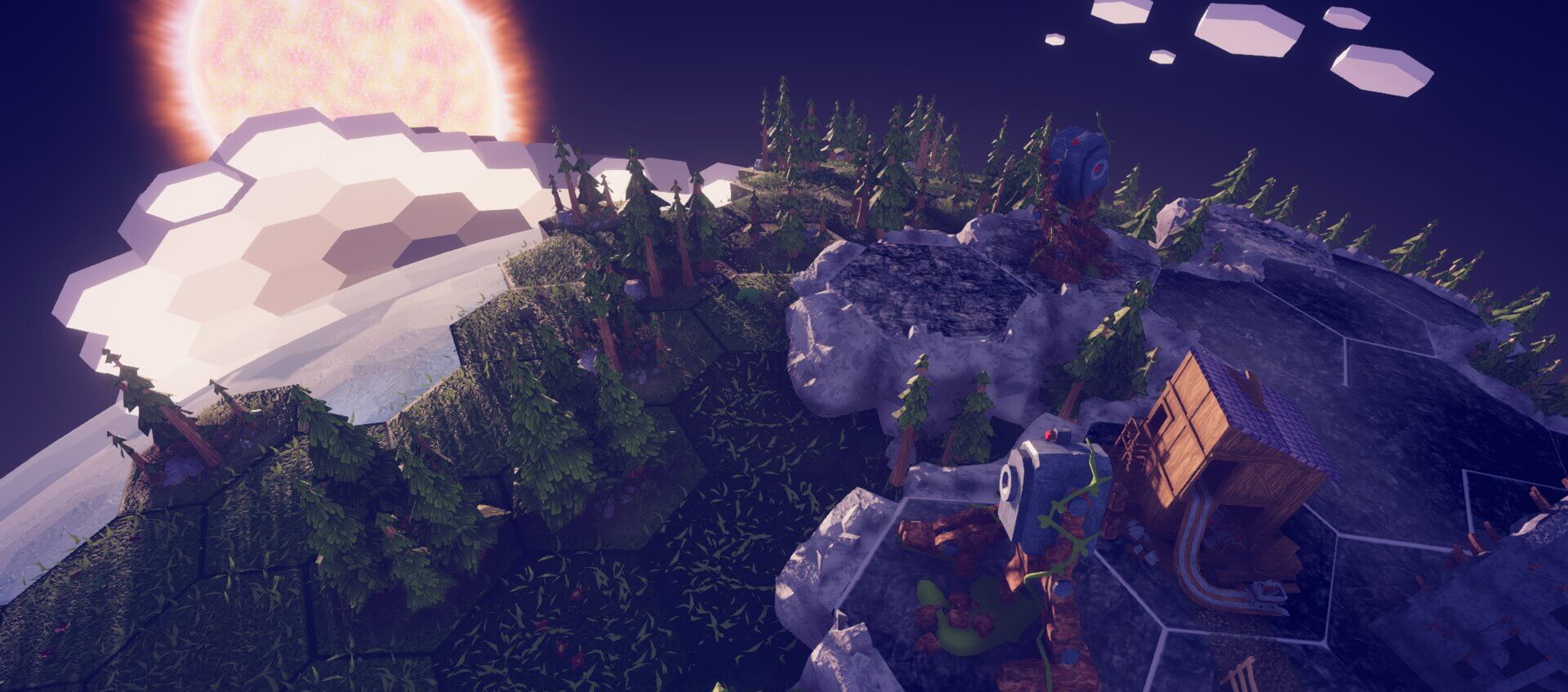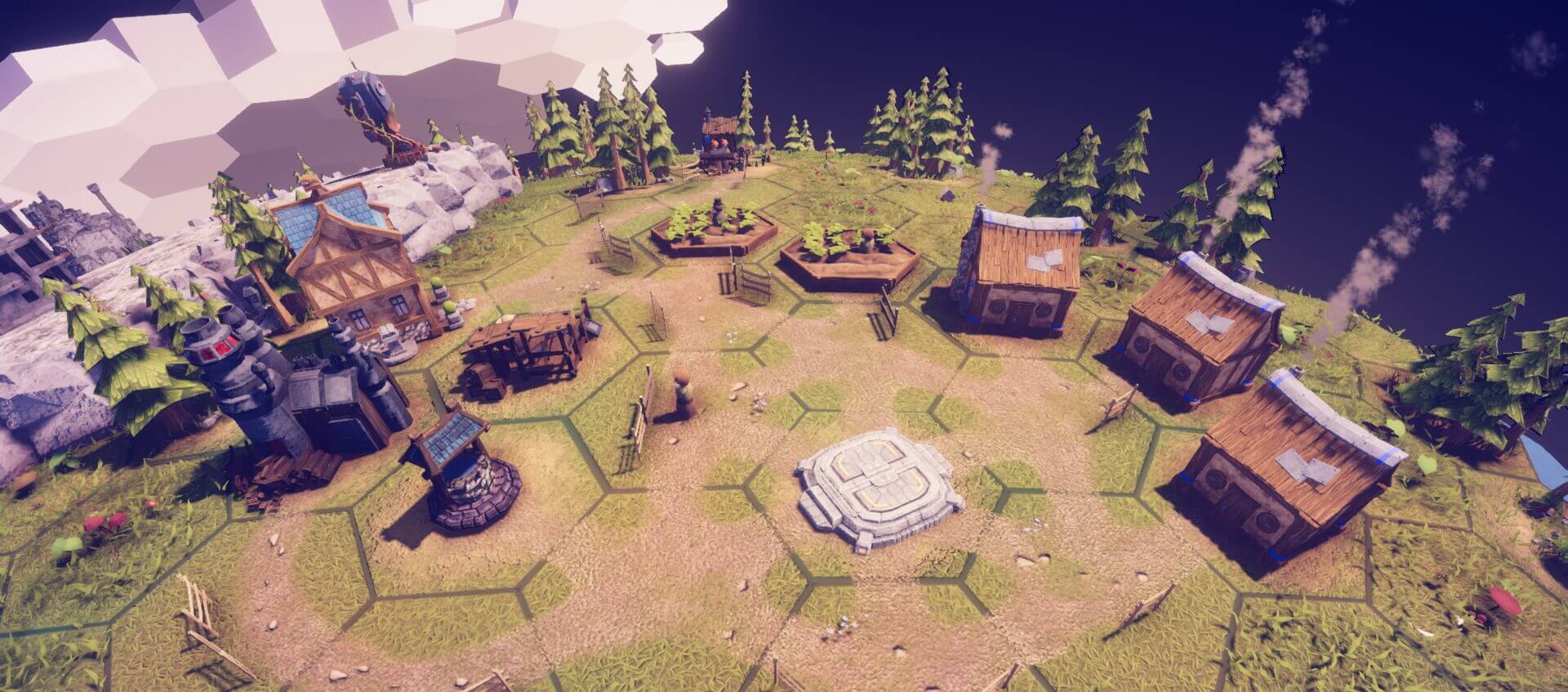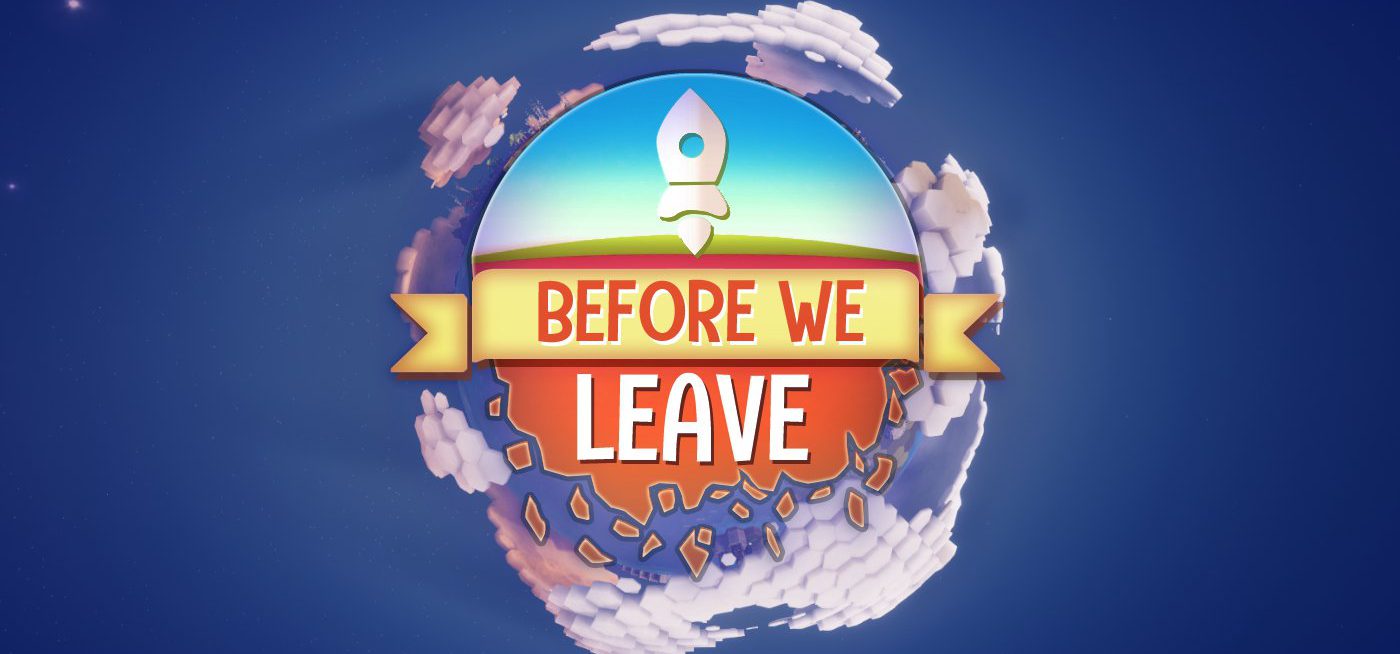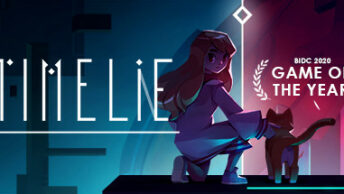Before We Leave is a “peaceful” city builder with really neat presentation but unfortunately lacking in depth or meaning. It takes away violence but leaves a gaping hole unfilled.
Type: Single-player
Genre: City Builder, Strategy
Developer: Balancing Monkey Games
Publisher: Balancing Monkey Games
Release date: May 8, 2020


Introduction
Before We Leave is a city-building game in the likes of Anno, with a post-apocalyptic (you play a reemerging civilization after living in bunkers due to some planetary catastrophe). You rebuild civilization anew, at an accelerated rate due to study of decrepit ancient technology lying around.
The two main “features” to set it apart from Anno is the complete lack of violence (no combat, no armies, no enemies – but no friends) and the board being made of hexagons, more akin to modern 4X games.
Unfortunately, I think that both of these deviations carry with them significant problems and don’t add to the game once you look under the surface.
Caveat
Before getting into the review properly, I need to say I didn’t get to play too much of the game (though I plan to play some more and update the review if warranted) – because my computer broke. I completed the tutorial, found a bug and had to start a new game. I didn’t get too far into the new game.
So, effectively, I’ve just played the tutorial. This review is based on that, and on what I expect to see in the future, based on the writing and incomplete tech-tree.
With that out of the way, onward to the review proper.

General Gameplay
You start by building houses and potato fields to feed your people. Every building needs to be connected by roads. You quickly find the need to expand and gather wood, stone, and later ore to process into metal to fashion tools, build ships, and so on. You’ll soon be moving into oil and fuel, apparently learning nothing from the preceding apocalypse.
There is also a tech-tree where you unlock new buildings by researching piles of ancient technology lying around.
You find and repair a ship, you can explore the rest of the planet to colonize new lands; and the loop repeats when you repair a shuttle to colonize new planets.
Buildings have adjacency bonuses and penalties (woodcutters benefit from being adjacent to more trees, houses from being adjacent to food fields, and so on) and there’s also pollution to consider. Some industries, especially having to do with mining and fuel create a lot of pollution which impacts people’s happiness and the productivity of some buildings.
There are also some more minor mechanics like having to clothe people to walk in the desert (not sure how that works, didn’t have to worry about it, about which I write more below) and using luxury goods to keep people happy.
There are three problems – first is the roads (fairly minor, but still a problem) due to the hexagonal nature of the board; second is the lack of violence; third is pollution.
Roads
Anno 1404 may very well be my favourite city-building game, although I have not played many. One feature of Anno, though, is the need to connect every building with roads. Why does it work so well in Anno but not in Before We Leave?
In short, it’s the hexagonal board. In Anno, because it is played on squares, most buildings occupy several tiles in a rectangle, being MxN; roads are only 1×1. This means that, for large M and N values (which are usually between 2 and 5 or something), buildings are much larger than roads. So most of the playing space will be taking by buildings, and the roads are a mini puzzle to connect them.
In this game, however, everything occupies a single tile. Hexagons make it unwieldy to have buildings occupy multiple tiles (though there are some that occupy 2 tiles or so). The roads occupy way too much of the playing field. Everything feels cramped and too many valuable tiles are lost because of the huge roads you’re forced to place. Roads stop being a finely tuned network and become rather bulky, wasting a lot of space.
It isn’t a huge problem, but I find it detracts a lot from the satisfaction of setting up a city. It lacks a lot of elegance.

Violence
I often think about how to make games that don’t rely on violence and expansion. These are just two aspects that permeate most games we play – and they work really well, even if they may be or turn “ugly”. The biggest problem here is that you can’t just take those aspects out of games – you need to supply something to fill their place. Before We Leave does not and this has deep implications for the game.
Another problem is that violence and competition are deep and spill over to many other aspects of games.
This game is non-violent in two ways:
(1) There are no competing civilizations;
(2) Your peeps never die.
Both of these are deeply problematic.
The fact that there are no competing civilizations (1) means that you don’t really need to care about doing things properly. There’s no race. Why do you care that something is inefficient? Just press the 4x speed button and way for a while.
While I dislike RTS games for being reduced to a race entirely (with a very fixed building order and so on), removing competition will “deactivate” other aspects of the game – that no longer serve the purpose they did before.
Why do I care about having poor building placement and low productivity? There’s no rush.
Having immortal peeps (2) plays on the same theme as above. You don’t need to plan anything or worry about having a working civilization. You can do things very haphazardly.
There is no real problem to solve, here. You could have Human against Human, or Human against Wilderness. In Before We Leave, you barely have “Human”.
Filling the Void
While the game takes out the ugliness of violence and colonization, it provides no alternative. Where are the utopian visions of a post-scarcity economy where everyone dedicated themselves to one another and art and learning?
What you get is a very abstract and useless “happiness” meter. I never worried about it, either, because I had no reason to. No violence, no death, why am I optimizing for an arbitrary meter? It having the name “happiness” doesn’t change much.
The biggest problem, also, is that the game leaves every other “institution” intact. Everyone still calls about pointless luxuries (even in the absence of competition) like gems and spices; your sole purpose is still to build a bigger civilization to reach the next threshold to build the next building or whatever.
This is almost beside the point, though, because you don’t need to worry about any of it. Happiness, productivity, pollution – you can just wait while you amass the resource to reach the next arbitrary goal. Competition and death give some context to why these things matter.
Maybe you want to preserve your values and way of life (to the best extent possible, though this is a rather ironically impossible goal) against competing civilizations.
Maybe you living in a very harsh environment and are trying to find a way to survive.
Maybe you dedicate yourself to art and other people or any other pursuit you want (and makes sense in context).
Before We Leave removes the first two “maybes” without providing a third. All things being equal, this is a fairly standard, but handicapped game. It does nothing new, but lost a limb along the way.
Pollution
Pollution seems to be an important, possibly a central, element of this game. Coming straight out of an apocalypse, you would thing people would be more mindful about ecological concerns, right?
Well, not really. The game doesn’t provide any real mechanics to manage the environment. You never grow trees, though you can cut them down. You will also deplete every other resources, from stone, to ore, to ancient technology, forcing you to venture out of the continent or the planet to find the next deposit to exploit.
I’m not sure if there’s an end to this. Maybe the point of the game is to deplete every resource. Until space-whales happen (which the game hints at but I’ve never seen, so I’ll assume they’re not a big deal).
Sure, pollution affects productivity and happiness. Surely, that’s significant, right? Well, no. I mean, the pollution is a very local “thing”. Pollution affects maybe adjacent tiles, or in a two tile radius.
But that’s it. The planet doesn’t care. Your peeps don’t care, at least not beyond the immediate proximity of the industrial “block”.
Which, again, feels like a lost opportunity. You could make a whole game about pollution. But then pollution had to matter.
As it stands, pollution affects only productivity and happiness which are themselves rather pointless in the absence of competition (well, productivity; but maximizing happiness as an abstract meter will soon turn into Nozick’s hedonistic machine).

Conclusion
Despite the rather negative review, I don’t hate the game – and maybe it does fill the void somewhere along the line (in which case I’ll definitely come back and change the review).
But it’s in the very awkward spot of being very much like Anno, with a lot of the same baggage, but without a crucial elements around which most mechanics revolved.
If you want a very casual city-building game, you can get some value out of this. The game is beautiful and unique in its art-style with some neat tricks. Its heart is in the right place.
As a whole, though, I don’t see this as a fruitful deviation from the norm of the genre. There is a lot of potential depth, but the game never managed to bite into any of the juicy stuff.










